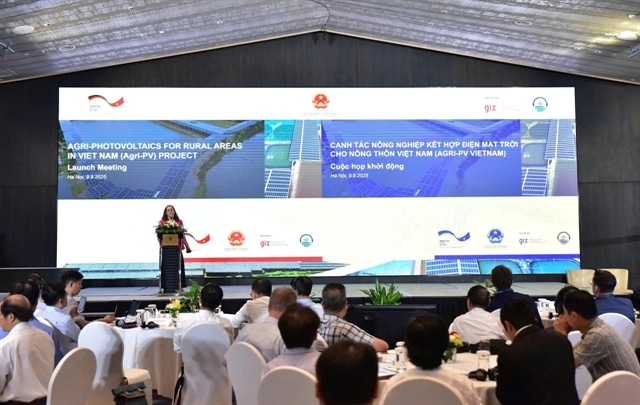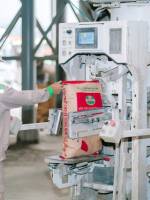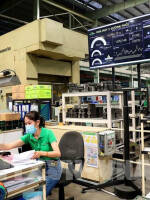
Việt Nam has started its first dedicated research project on combining solar power with agriculture, aiming to increase farmers’ incomes while accelerating the country’s energy transition.
The initiative, known as the Agri-PV project, was officially launched in Hà Nội on Tuesday by the Ministry of Agriculture and Environment (MAE) in partnership with the German Development Cooperation Agency (GIZ). It marks the first project in the agricultural sector that focuses specifically on solar energy for rural households.
Speaking at the launch, Deputy Director General of MAE’s International Cooperation Department Phạm Ngọc Mậu highlighted the project’s dual benefits.
“Integrating solar energy with farming on the same land can deliver substantial economic gains, contribute to gender equality and help farmers boost their livelihoods while supporting Việt Nam’s energy transition,” he said.
According to Nguyễn Thế Hinh, deputy head of the Agriculture Projects Management Board and director of Agri-PV, Việt Nam’s solar sector has experienced exponential growth. Installed capacity increased from just 272MW in 2019 to more than 16GW by the end of 2024. Projections suggest solar capacity will reach 22GW by 2030 and 168GW by 2050.
The Agri-PV project sets a target of deploying at least 10 pilot models for agricultural solar plants during its three-year implementation from 2025 to 2027. These pilots will provide crucial insights into how farmers can benefit from integrating crop production with solar energy generation.
The project also aims to strengthen knowledge among policymakers and stakeholders. By its conclusion, 65 per cent of 20 key policy and sector representatives are expected to have improved their understanding of the current state and future potential of agri-solar development in Việt Nam.
Funded and supported by GIZ, the Agri-PV initiative addresses both policy gaps and technical barriers.
Hinh said that the project will assess Việt Nam’s agricultural solar potential, design suitable development strategies and deliver advisory services to stakeholders. It will also help mobilise resources for scaling up the model nationwide, aligning with the country’s commitments to a just energy transition, net zero emissions by 2050 and NDC 3.0 climate targets.
Head of Agriculture and Climate at GIZ Vietnam Sonja Esche stressed that agri-solar is not simply about “placing solar panels on fields”.
Instead, it is about creating synergy between two systems, optimising energy production and crop yields simultaneously, Esche said.
“When designed well, farmers can enjoy stable incomes from crops and electricity while ensuring efficient use of land,” she noted.
Despite its potential, scaling up agricultural solar farming faces significant hurdles. Việt Nam currently lacks clear policies to promote the practice. Knowledge and technical capacity remain limited, with fragmented studies and a shortage of reliable pilot data.
Stakeholders from local authorities to farmers still lack experience in managing such hybrid systems. Moreover, there is no national database consolidating existing models, which hampers replication.
Dr Michaela Baur, Country Director at GIZ Vietnam, said that Việt Nam can draw on international experience to bridge these gaps.
With over three decades of presence in the country, GIZ has extensive expertise in renewable energy and agriculture projects, particularly in facilitating public-private partnerships and regulatory frameworks.
She pointed out that countries like Germany, Thailand, India and Brazil have already piloted agri-solar models, generating valuable lessons for emerging economies.
“These exchanges of policy and practice are exactly what this project aims to enable,” Baur said.
(BIZHUB/VNS)




